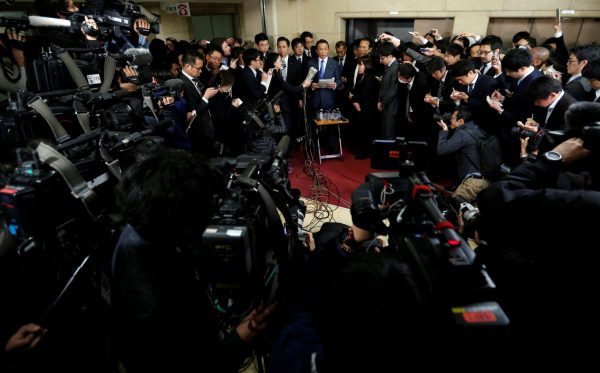The original documents contained the names of Prime Minister Shinzo Abe and his wife Akie Abe, Minister of Finance Taro Aso and members of the National Diet. The explanations given by the government for the illicit rewriting of the documents were proven false, which led to the resignation of Nobuhisa Sagawa, who was at the time commissioner of the National Tax Agency and director general of the MOF’s Financial Bureau.
The essence of the Moritomo Gakuen controversy is the slipshod management of information disclosure and public documents by central government ministries in Japan.
Under Japan’s Information Disclosure Act for Administrative Organs, the government is obliged to disclose any item of information requested. Yet there is wide acceptance of government agencies’ avoiding disclosure of matters related to diplomacy, defence, policing and civil order. Ministries assign to documents a preservation period of one to 30 years, according to criteria such as importance and document type, and each ministry has wide discretionary power as to which preservation period is assigned.
Most documents are checked by the Cabinet Office at the time of discarding, but documents assigned a preservation period of less than one year are left in the hands of the relevant ministry. Behind the problematic cover-ups, destruction of records and falsification of official documents that surfaced in the Moritomo Gakuen scandal are these institutional problems in Japan’s information disclosure policy and its management of official documents.
In an ordinary Diet session in 2017 there were heated discussions regarding Japan Self Defense Force (SDF) daily reports on its South Sudan Peacekeeping Operation (PKO). The topics of the alleged reports included an armed conflict during the SDF’s mission, but the Ministry of Defense (MOD) announced that they had destroyed those reports sometime after the incident. It emerged later that the MOD had not destroyed those reports, and under a hail of severe criticism then defense minister Tomomi Inada resigned.
SDF daily reports are designated ‘administrative documents’. They are subject to requests for information disclosure, so the SDF cannot refuse disclosure given the current information disclosure law. If there were problems in terms of confidentiality, the SDF could keep any document partly confidential by blacking out certain parts. Perhaps to avoid disclosure entirely, the SDF categorised many of its documents as ‘to be destroyed in less than a year’. Since the SDF gave that designation to the daily reports on the South Sudan PKO, they were destroyed at the discretion of the commander.
In response to severe Diet criticism of the South Sudan PKO daily reports issue, the MOD changed the retention period of its daily reports from less than one year to 10 years. But this carries its own problems: disclosure of the daily reports involves a risk that information might leak out to foreign spies.
After the Moritomo Gakuen issue has settled, information disclosure and the management of official documents by Japan’s central government ministries will likely become much stricter. Discussions on how to improve the management of official documents have already started in the Diet. As in the case of the daily reports of the SDF, ministries will assign the designation ‘destroy in less than one year’ to fewer and fewer documents, and the number of documents they designate as ‘store for 10 years’ will increase.
In addition, completeness of information disclosure and official document management could become political issues beyond simple changes in procedural rules. If the opposition parties make significant gains in the Diet, such as driving Finance Minister Aso to resign, they could gain enough leverage to abolish the Act on the Protection of Specially Designated Secrets. But if the official discretionary power of bureaucrats to designate non-disclosed information were reduced, and if the Act on the Protection of Specially Designated Secrets were abolished, Japan might not be able to control the confidentiality of information and could lose international credibility.
The sloppiness of government ministry management of official documents and information disclosure is clear to see in issues such as the South Sudan PKO daily reports and Moritomo Gakuen. But the current countermeasures are extremely vulnerable from the viewpoint of intelligence security. Instead, Japan could adopt a system similar to that generally in place in European countries and the United States: official documents are permanently preserved and are fully disclosed after some 30 to 50 years. This would enable a balance between the right to know and intelligence security.
Masato Kamikubo is Professor at Graduate School of Policy Science, Ritsumeikan University, Japan.


So is the author suggesting that info about the SDF’s operations or the FM’s internal decision making processes should be fully disclosed after 30-50 years? ‘Intelligence security’ takes that much precedence over the voters’ rights to know what the government is really doing?